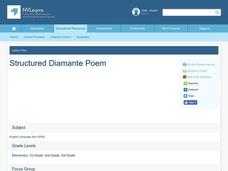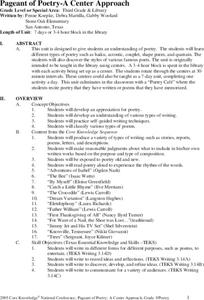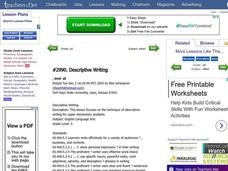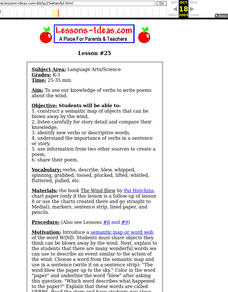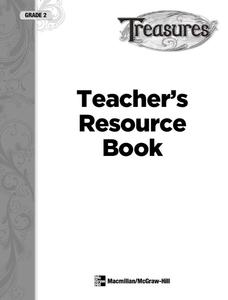Poetry4kids
Personification Poetry Lesson Plan
Scholars take part in two exercises to boost their knowledge of personification. After reading a detailed description and excerpts from famous poems, writers list action verbs and objects then combine words to create a humorous...
Poetry4kids
Onomatopoeia Poetry Lesson Plan
Two exercises boost scholars' knowledge of a onomatopoeia with excerpts from famous poems. In exercise one, participants circle onomatopoeia words. Exercise two challenges writers to choose three words to use in an original poem.
Curated OER
"Ing" Words as Descriptors
This clever lesson has your learners listen to story about bugs, work together to brainstorm list of "ing" words that describe bugs, create t-chart of words, choose words to place in poem template to create class poem about bugs, and use...
Curated OER
Acoustic Poems
Students explore acrostic poems. In this interactive poetry activity, students visit the ReadWriteThink.org website to view characteristics and samples of acrostic poems. Students develop acrostic poems by using the interactive site.
Poetry4kids
How to Write a Diamante Poem
A lesson begins with a description of a diamante poem and the rules to follow while writing one. Scholars examine the ins and outs of synonym and antonym diamantes, then compose an original poem using their newfound knowledge.
Denver Art Museum
Descriptive Haiku
Even though this is technically an art instructional activity, haiku poetry is actually the main focus! Learners view photographs of Japanese tea caddies. They list five descriptive words for the caddies, then write haiku poems using the...
Curated OER
Acrostic Book Report
Students read the story Wild Horse Winter and construct acrostic poems. In this poetry lesson, students use adjectives and events in the text to develop an acrostic poem.
Curated OER
Structured Diamante Poem
Youngsters review nouns, adjectives and verbs. In this poetry lesson, readers choose a set of antonyms and create a list of synonyms, verbs and adjective for each. Students use the words to write a Diamante poem.
Poetry4kids
Simile and Metaphor Lesson Plan
Similes and metaphors are the focus of a poetry lesson complete with two exercises. Scholars read poetry excerpts, underline comparative phrases, then identify whether it contains a simile or metaphor. They then write five similes and...
Curated OER
Poetry Passport
Passport photos are notoriously unflattering but here's an activity that encourages youngsters to create a poetic picture of themselves using each category on the passport as a prompt for a poem.
Poetry Society
A Conceit Poem
Young writers needn't be self-involved to craft a conceit. Directions for how to craft this form of extended metaphor, models, and a worksheet are all included in the packet.
Curated OER
Splish, Splash Poetry
Young scholars write weather shape poems and sing weather related songs. For this creative writing lesson, students read the book, It's Raining, It's Pouring and list weather words they heard in the story. Young scholars use the writing...
Curated OER
Color Poems
Students describe colors. In this descriptive writing instructional activity, students brainstorm color descriptions using all of the senses except sight. Students write poems including similes, sensory images, and interesting word...
Curated OER
A Center Approach to Poetry
Students experience the different types of poetry in order to classify them. In this poetry lesson, students discover the multiple types of poetry while reading in the library. Ultimately, the students create their own poetry and share...
Curated OER
Author's Voice in Passage
Students explore author's voice. In this literary elements and reading comprehension lesson, students listen to two poems about snakes (included) and identify adjectives and other descriptive words and phrases that help them determine...
Curated OER
Descriptive Writing
Young scholars discuss the importance of using adjectives in writing. They separate into five groups, each group is given a bag with an object inside to describe using just one sense. They write a description of a Hershey's Kiss using...
Curated OER
Food Poems and Base Words
Students identify base words to decipher new vocabulary. In this vocabulary lesson, students complete a graphic organizer while reading about food and nutrition. Students discuss simple and complex endings when using words.
T. Smith Publishing
Your Five Senses
Using the five senses is a creative way to write descriptively. Learners read 25 words, both nouns and verbs, and place them into the category labeled with the correct sense.
Curated OER
Introduction to Ludwig van Beethoven
"Ode to la Tortilla" and "Ode to Joy"? Sure! Use Gary Soto's poem to introduce learners to the ode format. After examining the descriptive words Soto uses, class members study a poster of Ludwig van Beethoven, suggest words that describe...
Reed Novel Studies
Winnie-The-Pooh: Novel Study
Winnie the Pooh lands in a gorse-bush plant in chapter one of A.A. Milne's beloved children's novel, Winnie-the-Pooh. With the novel study, scholars research three interesting facts about the plant. They also compose a four-line poem...
Curated OER
Volcano Acrostic Poem
For this acrostic poem worksheet, students explore descriptive poetry. Students use the letters of the word "volcano" to write a poem about volcanoes.
McGraw Hill
Phonics Teachers Resource Book
Looking to improve your classes literacy program? Then look no further. This comprehensive collection of resources includes worksheets and activities covering everything from r-controlled vowels and consonant digraphs, to the different...
Curated OER
What is a Haiku? How Do You Write a Haiku?
Haiku poetry is explored in this language arts lesson. Yong readers identify the characteristics of haiku and read several examples. Students make connections between their study of Japan and the poetic form of haiku, and they write...









